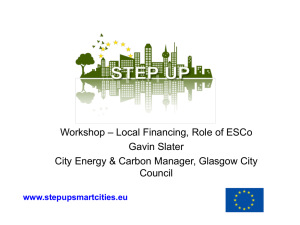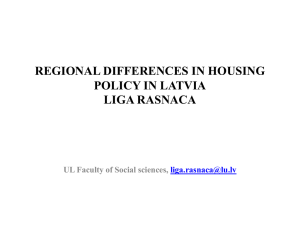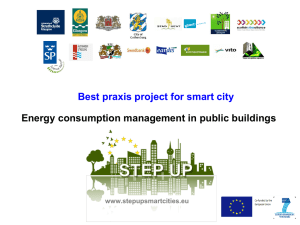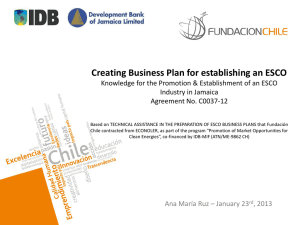Promoting the development of an energy efficiency service (EES)
advertisement
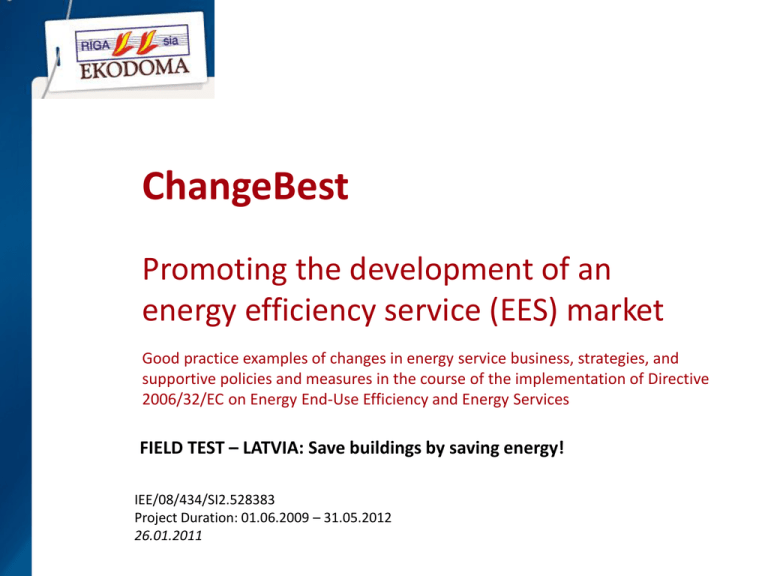
ChangeBest Promoting the development of an energy efficiency service (EES) market Good practice examples of changes in energy service business, strategies, and supportive policies and measures in the course of the implementation of Directive 2006/32/EC on Energy End-Use Efficiency and Energy Services FIELD TEST – LATVIA: Save buildings by saving energy! IEE/08/434/SI2.528383 Project Duration: 01.06.2009 – 31.05.2012 26.01.2011 PROJECT SUMMARY • The ChangeBest project with its 20 project partners and more than 50 partners from practice aims at supporting the implementation of the EU Energy Service Directive, as well as at contributing to a further development of the energy efficiency service market. • In order to achieve this, new energy (efficiency) services are developed and promising energy efficiency service business cases and strategies are implemented, both in close cooperation with energy companies and energy service companies. BACKGROUND – A main objective of the Energy Service Directive is to stimulate the market for energy services and for the delivery of other energy efficiency improvement measures to final consumers. – Against this background it is important to know: • How and to which extent can the energy efficiency service market be further developed? • What are appropriate business strategies and promising services not only for „advanced“ companies but also for „beginners“? • What is the suitable policy framework for stimulating market development and for overcoming existing barriers? • Which role can ESCOs and energy companies developing towards sustainable energy service companys play? OBJECTIVES AND MAIN STEPS – Main objectives of ChangeBest are to: • Assist energy companies and energy service companies in entering the B2B and B2C market for energy efficiency services • Contribute to the development of the energy efficiency services market as part of the implementation of the Energy Service Directive • Demonstrate good practice in implementing the Energy Service Directive – This will be achieved by: • An empirical analysis of the energy efficiency service market and the respecitve economic and policy framework • A field test of new and/or improved energy efficiency services in cooperation with several energy companies and energy service companies FIELD TEST – LATVIA: SAVE BUILDINGS BY SAVING ENERGY! • ESCO and Energy Performance Contract in multifamily houses: – The basic idea is taken from the public, commercial and industrial sector – An ESCO is a company that offers energy services which may include implementing energy-efficiency projects (and also renewable energy projects) and in many case on a turn-key basis FIELD TEST – LATVIA: SAVE BUILDINGS BY SAVING ENERGY! • The three main characteristics of an ESCO: 1. ESCOs guarantee energy savings and/or provision of the same level of energy service at lower cost 2. The remuneration of ESCOs is directly tied to the energy savings achieved 3. ESCOs can finance, or assist in arranging financing for the operation of an energy system by providing a savings guarantee. • The scheme has been adapted and adjusted to the residential sector for comprehensive building renovation in Latvia: – Important driver availability of structural funds – High heat energy tariff – Suitable and well organised house management company http://re.jrc.ec.europa.eu/energyefficiency/ESCO/index.htm FIELD TEST – LATVIA: Save buildings by saving energy! THE BUSINESS CASE IN BRIEF • The vast majority of existing multi-family buildings in Latvia, and Eastern Europe in general, have not undergone any major energy conservation improvements • Average consumption of heat in buildings in Latvia ranges from 220-250 kWh/m2/year. • Average consumption of heat in buildings of 110140 kWh/m2/year (or less) is possible. • Often the residents are paying high energy bills and still receiving unsatisfactory service FIELD TEST – LATVIA: Save buildings by saving energy! BUSINESS MODEL • Comprehensive renovations of buildings based on Energy Performance Contracts (EPC) • The Energy Performance Contract: – collective agreement with the apartment owners – 10 to 20 years agreement depending on investment level and energy tariff – all residents are guaranteed comfortably heated apartments (21.5 C) – that flat-owners will pay for the amount of energy that the building would have consumed had it not been renovated – calculation based on historic energy consumption data of the building (baseline study) – The difference between this theoretically calculated amount of energy, and the real energy consumption after the renovation, flows to ESCO. FIELD TEST – LATVIA: Save buildings by saving energy! WHAT IS “COMPREHENSIVE RENOVATIONS” • Preventing heat loss out of the building envelope • Preventing losses in circulating heat and hot water through the building • Preventing overheating in apartments by reducing heat delivery in times when it is not needed • Repairs or improvement to halt and prevent structural problems caused by corrosion • Discretionary improvements to the looks, comfort and overall impression of the building, which can best be done as part of the overall renovation. THE PLANNING AND RENOVATION PROCESS • In total the process for one building takes 12-15 months: – – – – – – – – Pre-selection of Buildings and Cost-Benefit Analysis Resident Principal Approval of EPC Energy and Technical Audits Project Design and Signing Final EPC Cost Estimate and ERDF application Tender procedure Actual construction work Building into exploitation and receipt of subsidy FIELD TEST – LATVIA: Save buildings by saving energy! RENOVATION WITH ESCO House management company Building Payment of bills Residents Haouse management services Payment for energy savings Long term contract ESCO Renovation Payment for energy comfort guarantee Energy audit Project design Construction Investment Maintenance FIELD TEST – LATVIA: Save buildings by saving energy! THE BUILDINGS • Almost all energy saving measures extend the lifespan of the buildings; • Comprehensive renovation: – prevents further decay and corrosion of the building envelope – guarantees the safety and continued functioning of the internal networks. – provides good living spaces for Latvian families for at least another 20-30 years. • The living conditions of inhabitants, the value of their property and their pride of their house and neighbourhood will rise and their maintenance cost will drop. • heating bills will drop by 50% or more at the end of the contract period. • Without a comprehensive renovation – the maintenance of buildings will become ever more expensive and complex – eventually leading to unlivable and worthless buildings FIELD TEST – LATVIA: Save buildings by saving energy! THE RESIDENTS • The mass privatization of apartments in the 1990’s has resulted in over 90% occupant-owners. • Many residents are cash poor (low incomes with comparatively high heating bills), but asset rich (ownership of debt free apartment). • Except for a small percentage of flats there is no rental stock or institutional ownership by large public or private entities. • Decisions about the maintenance of apartment buildings lie with each and every individual apartment owner. • Flat-owners are typically not able to agree on investments and organize the much needed renovation process by themselves. • They lack the required technical and organizational skills and many residents, especially the elder generations, are very risk averse. • Many are scared of any extra financial obligations, or changes to the status quo. • Often residents are not aware of the need and technical options to lower their energy consumption. • Additionally, residents are used to a high state involvement FIELD TEST – LATVIA: Save buildings by saving energy! THE RESIDENTS AND ESCO • The ESCO investment model is ideally suited for the housing conditions in Eastern European • It takes all the financial and technical risks and decision-making away from the residents and places them with a professional third party. • The fact that not residents, but the ESCO takes a bank loan is an especially important reason for residents to go for the ESCO scheme. • In any case, as everywhere else in the world, it is not easy for a flat-owner to simply walk away from the utility bills without eventually loosing his property. In Latvia buyers of flats always check if the previous owner has arrears in heating and maintenance bills and these need to be paid before a sales contract is signed. • Only in case a bank holds a mortgage on the flat for an amount larger than the forced sale value, could the maintenance company end up never being paid. • ESCO will not take on a renovation in a building with high debts or a significant number of excessively high mortgages. FIELD TEST – LATVIA: Save buildings by saving energy! HOUSING MAINTENANCE COMPANIES • Currently municipal housing maintenance companies have been officially privatized, but with the municipality as only shareholder. Some have been sold to private owners (Cesis). New private housing management companies have emerged but often they are very small and consist only of a few bookkeepers and handymen. • People are generally very angry and distrustful towards housing management companies. • This is a problem for ESCO because this general negative and distrustful attitude reflects on anybody trying to introduce changes and improvements. • The ESCO also relies on the local management company to perform most of the day to day duties in running the buildings. FIELD TEST – LATVIA: Save buildings by saving energy! HOUSING MAINTENANCE COMPANIES • This is an opportunity for municipality to improve the sector • There are also a few management companies, which have transformed themselves in recent years (Cesis and Valmiera). • The EPC specifies the role of the housing management company in collecting payments and performing maintenance for the building and thereby actually executes many of the EPC provisions. • The housing management company provides financial guarantees to ESCO for the payment collection services, taking the full responsibility for management of late payments and debt recovery. In this case both parties agree on mutually beneficial conditions. • In cases when the management company cannot ensure such guarantees, alternative solutions can be applied for the collection of late payments and debt recovery (for example, it can be done by the ESCO itself or subcontracted to third party). FIELD TEST – LATVIA: Save buildings by saving energy! CONCLUSION • City councils and municipal maintenance companies are eager to see their housing stock improved but currently struggle to make use of available EU subsidies. • Residents lack the know-how and organizational capacity and are usually not willing or able to organize the co-financing • ESCO offers a solution • The city administration organizes the first contact with the elders of the buildings and the housing management companies THANK YOU! Ekodoma 3-3 Noliktavas Street, Riga LV1010, Latvia Tel: +371 7323212 Fax: +371 7323210 Mob: +371 26745700 email: claudio@ekodoma.lv Web side Ekodoma: www.ekodoma.lv


